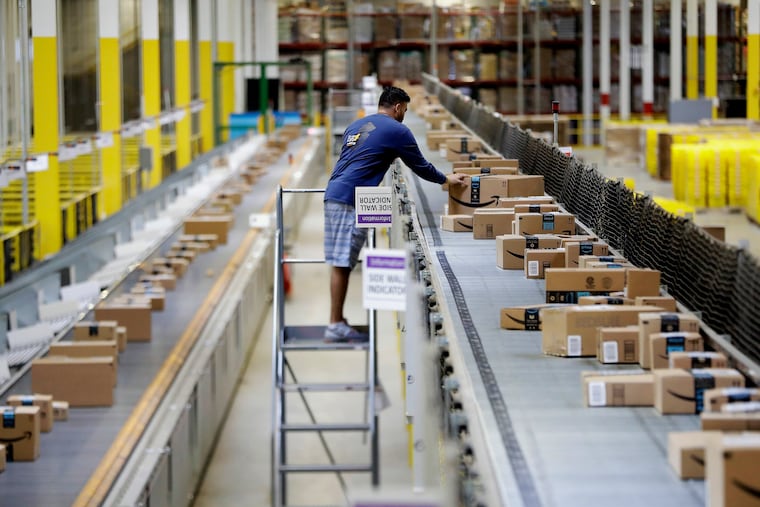U.S. Rep. Donald Norcross introduces bill aimed at bringing more protections to warehouse workers
The bill aims to bring more transparency around quotas for warehouse workers employed in an industry that has seen a high rate of injuries.

A bill introduced by U.S. Rep. Donald Norcross this month could bring transparency to warehouse workers about the production quotas they are held to and more protections from their employers about what those quotas can be.
The bipartisan Warehouse Worker Protection Act was introduced on June 5 by Norcross (D., N.J.). An accompanying Senate bill was introduced by Sen. Ed Markey (D., Mass.) in May.
“We understand a profit motive, but it cannot be above a worker’s safety,” Norcross told The Inquirer about the bill.
Since 2020, some 55 million square feet of warehouses have sprung up or are currently being built across the Philadelphia region, The Inquirer reported in May. While the construction has brought jobs with it, many of the entry level positions can be physically demanding.
Warehouse work has seen a high number of worker injuries recently, according to an audit from the U.S. Department of Labor Office of Inspector General released in 2023. The audit notes that in 2021, warehouse injuries and illnesses were happening at a rate of 5.5 incidents per 100 workers — over double the rate across all industries.
The dangers of warehouse work can also be aggravated by production quotas, the audit notes.
“Warehouse workers face hazards that can result in serious injury due to powered industrial trucks, loaded pallets, and the repetitive movements involved. These dangers can be compounded when time-based delivery quotas are used to drive production goals,” the report notes. “With high-speed fulfillment of online orders becoming the industry standard, some warehouse workers must work even faster.”
Injuries on the job
“The increasingly dangerous working conditions at warehouses across the country that result from these quota systems are wholly unacceptable,” Norcross said in a statement.
Amazon, one of the companies in the industry, is known for its quick delivery speeds. Critics have said productivity tracking can be blamed for the amount of injuries workers experience.
Amazon has repeatedly denied that the company uses quotas.
“Amazon is committed to manageable workloads, and employees are encouraged to work with intention, not speed,” said company spokesperson Maureen Lynch Vogel. “Like any business, we have performance expectations for all of our teams, but these expectations are based on multiple factors including the performance of the entire team, site-wide. It’s a common misperception that Amazon has fixed quotas, but we do not.”
The company also noted it has invested more $750 million this year toward “additional safety initiatives, programs, and innovations.”
“The safety and health of our employees is, and always will be, our top priority. Since 2019, we’ve improved our recordable incident rate in the U.S. by 28%, and our lost time incident rate by 75%, which gauges the frequency of the most serious types of injuries,” said Lynch Vogel.
The dangers of warehouse work have been felt locally in the region for years.
Amazon warehouses in Pennsylvania reported higher rates of worker injuries between 2017 and 2020 compared to other warehouses in the region, The Inquirer reported in 2021. Those workers either missed work or did light duties because of an injury.
More recently, workers at a West Deptford Amazon fulfillment center have also demanded better pay and working conditions, staging a strike in November as part of a multistate effort. The organizing committees that came together called on the company to stop issuing automated performance write-ups based on productivity metrics and to put an end to disciplinary measures also based on those metrics, The Inquirer reported in 2023.
Amazon denies that the company employees are given feedback via an automated process.
“If an employee with sufficient tenure is consistently performing in the bottom 5% of their peers, managers will talk with the employee to understand whether they need help, additional training, or if there are barriers preventing them from meeting expectations,” said Lynch Vogel.
What would the bill do?
The bill introduced this month includes requiring employers to disclose work quotas they impose on their workers. Employees would receive information about how those quotas are measured, repercussions for not meeting them, or incentives for achieving them.
“If you’re going to hold us up against a number, we need to know what that number is,” Norcross said. “We just want to know for the workers that when you do this, that they’re aware of it, and it’s not arbitrary, that there is a line that they can follow, and they know if they’re above it or below it, or dispute that it’s unreasonable.”
The bill would also prohibit the kinds of quotas employers could use, including prohibiting quotas that prevent workers from going to the bathroom or from using breaks they are entitled to such as a meal or rest period.
“The idea of not being able to go to the bathroom in the year 2024 seems a little ridiculous to all of us,” Norcross said.
The bill would ensure an individual trained in first aid be available on-site to get injured workers treatment more quickly. It would also create a Fairness and Transparency Board within the Department of Labor to enforce the legislation.
The International Brotherhood of Teamsters, a labor union that represents workers across the country, has been working for years to advance similar legislation at the state level.
“We suggested those four items in our bill, but we’re willing to have the discussion,” Norcross said. “What we’re not willing to do is sacrifice people’s safety.”